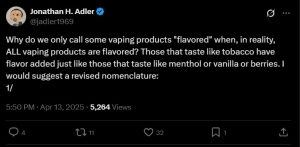Vapers Digest 14th April

Monday’s News at a glance:
Cochrane Updates ~ The Evolving EU Regulatory Landscape ~ New York Senate Sees Sense and Pulls Nicotine Pouch Flavour Ban ~ WHO’s hiring practices questioned amid budget constraint ~ Policy by Echo Chamber: A Critical Look at Becky Freeman’s Role in Shaping Vaping Regulation ~ Smoke-free surge stalled by feds clinging to old habits ~ Zyn ban falters amid industry backlash ~ Good Intentions, Bad Outcomes: The Flawed Logic of Washington’s Nicotine Tax ~ All Vapes Are Flavored Vapes, Some Just Have Cigarette Flavors ~ Era of ‘criminal enterprise’ feared by MPs and campaigners ahead of disposable vapes ban – as it emerged only 80 staff have been recruited to enforce it ~ How Dangerous Is Nicotine Poisoning? | Vaping360 – Watt The Puff?! EP.2 ~ The future of vaping in the UK ft. Martin Cullip | Vaping Unplugged Podcast Ep. 80
Two From Dave Cross, Planet of the Vapes
Cochrane Updates
As part of the Cochrane living systematic review, the leading body of work looking at vaping and smoking cessation, Associate Professor Jamie Hartmann-Boyce and Associate Professor Nicola Lindson discussed the new research evidence and interviewed Dr Monserrat Conde from the Nuffield Department of Primary Care Health Sciences, University of Oxford.
The Evolving EU Regulatory Landscape
The International Association on Smoking Control & Harm Reduction (SCHORE) has hosted a webinar to address the evolving regulatory landscape in the European Union. Taking place last week, the event featured international experts on tobacco policy who addressed regulative aspects of tobacco harm reduction both from the top-down perspective of the regulator and the bottom-up perspective of the consumer.
New York Senate Sees Sense and Pulls Nicotine Pouch Flavour Ban
Joseph Hart, The Daily Pouch
New York Senate Bill S443B was pulled on Wednesday last week. The absurd bill aimed to restrict the free distribution of nicotine pouches in retail settings and ban flavours like mint or fruit because of their alleged appeal to youths.
The arguments were built on the following shaky foundations:
- Nicotine pouches disproportionately attract youth users.
- Pouches should be dealt with like vaping products.
- Flavour bans would reduce the potential long-term health risks associated with nicotine addiction.
WHO’s hiring practices questioned amid budget constraints
24 Share Updates
The World Health Organization (WHO) is facing criticism for expanding its senior leadership in Geneva.
Critics warned that the increase in directors strains the organization’s limited financial resources, potentially diverting funds from crucial public health programs amid existing budgetary challenges.
“It is time for the WHO to refocus on its mandate of improving public health, instead of spending its resources on highly paid officials who support their dogmatism, such as alienating the hundreds of millions of smokers who deserve less harmful alternatives. With the U.S. withdrawing its support from the WHO, hiring more executives is unjustifiable,” said Anton Israel, president of the Nicotine Consumers Union of the Philippines (NCUP).
Policy by Echo Chamber: A Critical Look at Becky Freeman’s Role in Shaping Vaping Regulation
09algor, Australia, Let’s Improve Vaping Education (A.L.I.V.E.)
The Sax Institute’s interview – 28 May 2024 – with Associate Professor Becky Freeman offers a glimpse into the machinery behind Australia’s vaping policy — one that raises more red flags than reassurances.
1. “Research” as Pretext for Policy
Freeman admits early on that her vaping research was conducted with a specific policy agenda in mind. “100%. To me, that’s the main impetus for doing this research,” she says.

Smoke-free surge stalled by feds clinging to old habits
Martin Cullip, The Blaze
The U.S. nicotine market is undergoing a historic shift — one that should be celebrated as a major public health breakthrough. A new Goldman Sachs report forecasts that smoke-free nicotine products will surpass cigarettes in consumption by 2025 and come close to matching them in revenue and profit by 2035.
This shift isn’t the result of government policy. It’s happening because consumers are making better choices. Yet federal regulators appear determined to stand in the way.
Zyn ban falters amid industry backlash
Austin C. Jefferson, City & State New York
A divisive Zyn ban bill that rankled small-business owners and consumers alike has faded away this session like the sweet sting of a peppermint six-milligram pouch. Sponsored by Assembly Member Linda Rosenthal and state Sen. Brad Hoylman-Sigal, the proposed legislation would have banned the sale of flavored smokeless nicotine packets like Zyn.
According to Assembly Health Committee Chair Amy Paulin, a strong lobbying push got to committee members, leading to the bill being pulled from a Wednesday vote. Rosenthal still plans to amend the bill, but Paulin said its future rests on any possible overreaches from Big Tobacco.
Nellie Sly, NW Daily Marker
In recent days, Washington legislators have rolled out a new bill, HB 2068, banning the sale of flavored nicotine products and imposing a steep, new, flat tax on all products containing nicotine—pouches, vapor and cigarettes.
As with similar legislation in other states, the ostensible goal of the bill is to stop smoking and prevent kids from taking up nicotine use. A definite goal is also, of course, to help fill Washington’s gaping budget hole.

All Vapes Are Flavored Vapes, Some Just Have Cigarette Flavors
Jonathan H. Adler, Reason
Why do we only call some vaping products “flavored”? I ask because every vaping product on the market is flavored. Those that taste like tobacco have flavor added just like those that taste like menthol or vanilla or berries. So some vaping products taste like combustible tobacco products (with either tobacco or menthol flavor) and some do not. It is possible to make unflavored vaping products, but there is no market for such products so no one does.
Matt Strudwick, Daily Mail
The ‘woefully inadequate’ number of new recruits hired to enforce the disposable vapes ban will lead to a ‘new era of criminal enterprise’, MPs and campaigners have warned.
Only 80 apprentice Trading Standards officers have been employed and a ‘pathetic’ £10million allocated to police a booming black market economy predicted to be worth billions, with one third of all vapes sold in the UK already being done so illicitly.
The money is less than a third of what analysts said was required to enforce the new laws in England alone, for one year.
How Dangerous Is Nicotine Poisoning? | Vaping360 – Watt The Puff?! EP.2
Vaping360
Can you overdo it with nicotine pouches or devices? Let’s talk risks. Feeling dizzy, nauseous, or anxious after vaping a lot? You’re not alone. In this episode, we dive into what nicotine “overuse” really means – from mild symptoms (aka “nic sickness”) to rare but serious cases of nicotine poisoning.
The future of vaping in the UK ft. Martin Cullip | Vaping Unplugged Podcast Ep. 80
Vape TV / World Vapers’ Alliance
In this episode of the WVA Podcast, host Liza Katsiashvili speaks with British commentator and harm reduction advocate Martin Cullip about the UK’s evolving stance on vaping — and what it signals for global tobacco control.
They discuss looming tax hikes, potential flavor bans, and how the UK’s shift could undermine its once-progressive approach to harm reduction. Martin also unpacks the broader international context, including the role of the WHO and the Framework Convention on Tobacco Control (FCTC) in shaping misguided policies that may harm, rather than help, public health.
A look back at how things have moved on or otherwise…
Ecigs and the “collateral benefits”
On the respiratory function – Jérôme Harlay – PGVG
An article published in the scientific journal Pneumonia shows how a risk reduction practice, vaping, may lead to health benefits for smokers who quit smoking by switching to e-cigarettes. The authors critically address some of the concerns arising in relation to lung health, including respiratory infections and pneumonia….
Expert reaction to study looking at e-cigarettes
Point-of-sale displays, and teenagers – Science Media Centre
E-cigarettes are a relatively new technology and their positive and negative effects are subject to extensive debate. Publishing in the BMC Public Health journal a group of researchers have reported that in their study adolescents who recalled seeing e-cigarettes in shops were more likely to have tried vaping.
Visit Nicotine Science & Policy for more News from around the World







